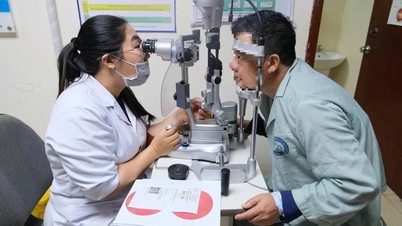Normal and healthy puberty with good nutrition and no excess calories usually occurs between the ages of 9 and 14 in boys and 8 and 13 in girls. However, in reality, more and more girls are starting to develop before the age of 8, the average age of first menstruation is under 10. Usually, early puberty occurs more often in girls than in boys.
1. The relationship between diet and early puberty in children
Early puberty is a sign of premature aging. Early puberty is not caused by a single factor. The nervous and hormonal systems that control the onset of puberty are complex, but research has identified a number of environmental and lifestyle factors that may contribute to early puberty.
One of the causes of this condition is a change in diet that affects the child's hormones. Therefore, to help children avoid early puberty, it is necessary to ensure that children have a healthy diet from an early age and maintain it for a long time.
Research has shown that early puberty in both girls and boys is due to a diet that is too high in animal products, high in fat, and processed foods. A diet high in meat, processed foods, etc. is associated with earlier menstrual cramps, while eating a healthy diet and exercising regularly will slow down the process of puberty.
Increased hormone activity earlier and more often leads to earlier puberty. Children whose diets are low in nutrients (based on analysis of macronutrients, vitamins, minerals, and some whole foods) tend to enter puberty earlier.

Food is a factor that affects early puberty in children. Illustration photo.
Excess fat produces more estrogen. The increase in overweight and obese children contributes to early sexual development. Many studies confirm the link between overweight children, early puberty, and nutrition in girls. A male hormone called androstenedione, produced in the adrenal glands and ovaries, is converted in fat cells to estrogen.
Fat cells are like estrogen factories. As weight increases, so do hormone levels. Excess body fat alters insulin, leptin, and estrogen levels, and these factors are thought to be responsible for the rapid increase in obesity-related early puberty.
A high-fat, low-fiber diet promotes the growth of certain bacteria that convert bile acids into sex hormones. The intestinal wall then absorbs these hormones and releases them into the bloodstream. The liver produces bile acids to digest fat. A high-fat diet produces more bile acids, which are converted into sex hormones. Additionally, inactivity can reduce melatonin levels, which interferes with brain signals that trigger puberty.
2. Essential nutrients for the body of young people during puberty
From an early age, a child’s diet should include as many natural plant foods as possible, including green vegetables, squash, corn, carrots, tomatoes, onions, mushrooms, nuts, avocados, beans, fruits and whole grains. It is important to continue this diet into puberty and adulthood. This means that healthy eating should be maintained throughout life.
During puberty, children will need more nutrition. A scientific diet is very important to help children reduce diseases as well as psychological syndromes that are easy to get during puberty. During this period, parents should prepare a rich daily menu for their children, rich in nutrients, providing enough energy for children.

During puberty, children will need more nutrition. Illustration photo.
Puberty is the stage when children need the most energy, specifically providing energy from calories in food. During puberty, on average, a girl needs 2200 kcal, a boy needs 2800 kcal.
Protein: An essential nutrient that helps children grow. Provide protein for children with foods such as chicken, pork, beef, eggs, cheese, shrimp, and fish.
Carbohydrate: Foods containing lots of sugar and starch that provide carbohydrates are also essential for this stage, such as bread, cereals, rice, potatoes, beans, noodles...
Lipids - fats: One of the groups of nutrients that provide energy for the body. Contributes to the structure of nerve cells, hormones... Children should choose healthy fats such as olive oil, coconut oil, cod liver oil, avocado.
Vitamins and minerals: This is an essential group for the body of young people in puberty as well as each of us. The body cannot synthesize vitamins and minerals by itself but must absorb them through a variety of foods every day. Children should be encouraged to eat a lot of green vegetables and fruits to have enough minerals and vitamins needed for the body.
Essential minerals important for teenagers include sodium, potassium, calcium, magnesium, phosphorus, selenium, iron, manganese, etc.
- Iron: This is a special micronutrient that cannot be ignored during puberty. Iron plays an important role in blood production, carrying oxygen throughout the body. Especially for girls, the monthly menstrual cycle can easily lead to blood loss, so iron supplementation is needed promptly. Foods rich in iron and protein such as meat, eggs, fish, nuts, etc. should be included in children's daily meals.
- Calcium: Essential for children's outstanding height development when combined with vitamin D, on average each child in puberty may need 1,200mg of calcium per day.
- Zinc: Affects enzyme activity, supports the immune system, and protects organs in the body.
- Magnesium: Essential for digestive function, also involved in blood sugar control and maintaining bone health.
- Selenium: Helps strengthen immunity, eliminate foreign elements that enter the body.
3. Necessary notes to improve health for children with early puberty
When experiencing early puberty, if the child is sedentary, it will inhibit the development of bones and muscle groups, leading to stunted growth and slow growth. Parents should encourage their children to participate in sports activities to help increase the body's resistance and also help improve the child's height.

Encourage children to play and exercise outdoors to develop height and physical fitness comprehensively. Illustration photo.
In addition to exercise, parents should also pay attention to their children's lifestyle. Children need to get enough sleep, at least 8 hours a day, and practice the habit of going to bed early and waking up early.
Illnesses or psychological syndromes that are common during puberty can be improved through a regular exercise and lifestyle. Parents can let their children participate in extracurricular activities or register them for physical classes. In addition, parents should also spend time talking with their children to overcome psychological changes during puberty.
During puberty, children are often prone to being overweight. Controlling the amount of fat from oil or snacks is an effective way to avoid this situation. In addition, remind children to drink enough water, eat 3 meals, especially not to skip breakfast.
Source



![[Photo] National Assembly Chairman Tran Thanh Man received a delegation of the Social Democratic Party of Germany](https://vphoto.vietnam.vn/thumb/1200x675/vietnam/resource/IMAGE/2025/10/28/1761652150406_ndo_br_cover-3345-jpg.webp)
![[Photo] Flooding on the right side of the gate, entrance to Hue Citadel](https://vphoto.vietnam.vn/thumb/1200x675/vietnam/resource/IMAGE/2025/10/28/1761660788143_ndo_br_gen-h-z7165069467254-74c71c36d0cb396744b678cec80552f0-2-jpg.webp)

![[Photo] Draft documents of the 14th Party Congress reach people at the Commune Cultural Post Offices](https://vphoto.vietnam.vn/thumb/1200x675/vietnam/resource/IMAGE/2025/10/28/1761642182616_du-thao-tai-tinh-hung-yen-4070-5235-jpg.webp)






















![[Photo] President Luong Cuong attends the 80th Anniversary of the Traditional Day of the Armed Forces of Military Region 3](https://vphoto.vietnam.vn/thumb/1200x675/vietnam/resource/IMAGE/2025/10/28/1761635584312_ndo_br_1-jpg.webp)













































































Comment (0)